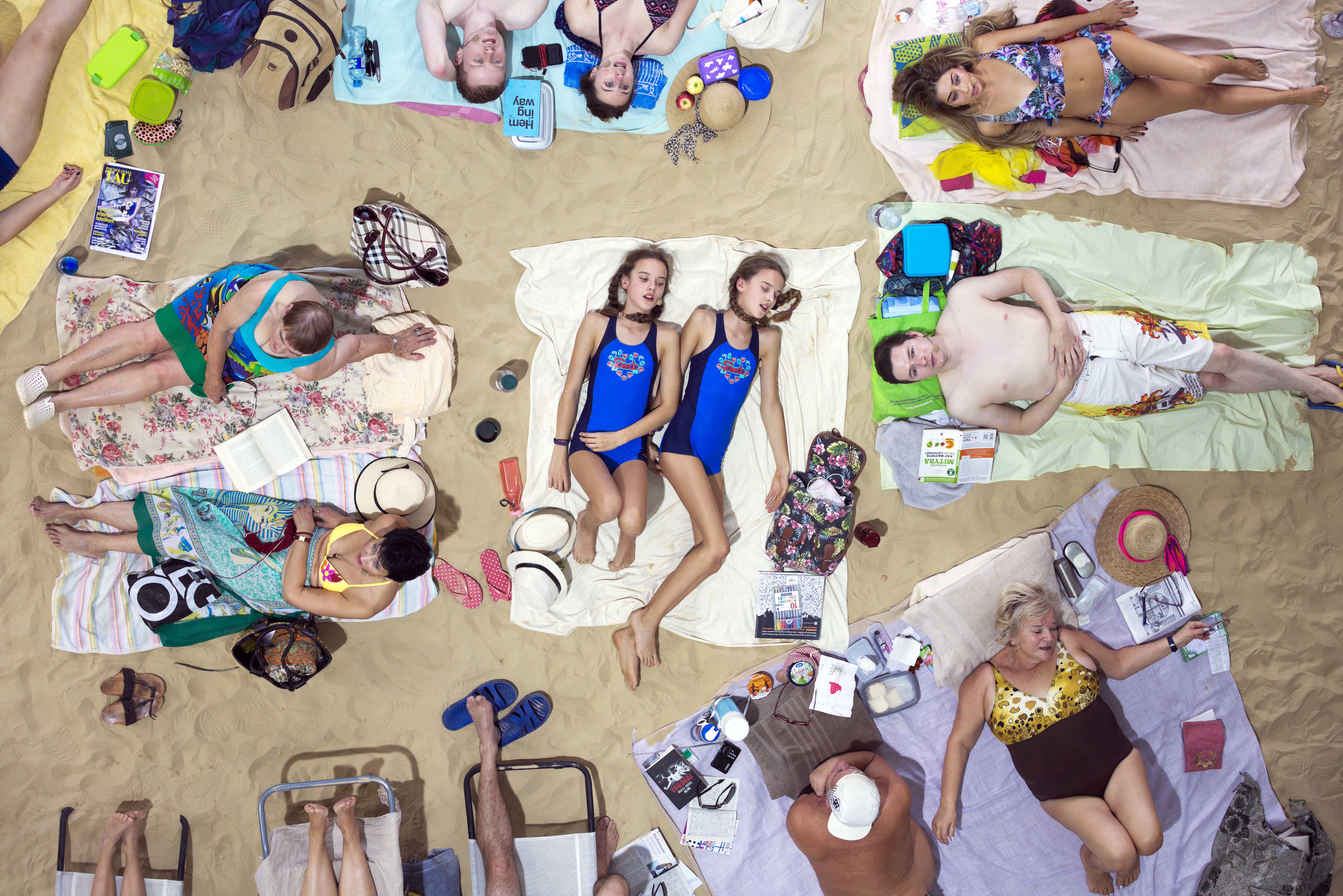
So much art about climate change is bad. It’s preachy, literal, unimaginative, and hung up on aerial shots of floods or topographical maps. By contrast, Lithuania’s pavilion at the Venice Biennale, titled Sun & Sea (Marina), is a revelation. It is a chilling work about climate change that is also an opera about a day at the beach.
From a balcony on the second floor of a warehouse in Venice, viewers look down at a sandy tableau, where performers of all ages and sizes splay out on towels under beach umbrellas, scrolling through their iPhones and thumbing through magazines. The sounds of seagulls and ice cream trucks echo in the distance. One by one, the vacationers sing about a world very similar to our own, full of minor inconveniences.
The project—floated as one of the leading contenders for the Golden Lion, awarded to the biennale’s best national pavilion—is the work of theater director Rugilė Barzdžiukaitė, playwright Vaiva Grainytė, and composer Lina Lapelytė. It first debuted at Vilnius’s National Gallery of Arts in 2017 in Lithuanian and was adapted into English for the biennale. (“It’s like a new piece because you have to rewrite the score in a new language—it was a challenge,” Grainytė told artnet News.) The Venice version has been organized by Lucia Pietroiusti, the curator of public programs at London’s Serpentine Galleries.
Sun & Sea, Lithuania’s contribution to the 2019 Venice Biennale. Photo: Neon Realism.
Unlike most works about climate change, which attempt to scare you into action but often simply paralyze you with the vastness of the problem, this performance sinks in by focusing on the mundane. “It’s about nothingness—nothing is happening,” Grainytė said. A cranky woman complains in song that nobody cleans up their trash or their dogs’ poop; a wealthy mother brags about seeing the “bleached, pallid whiteness” of the Great Barrier Reef and how excited she is for her eight-year-old to see it; a young man complains that it did not snow on Christmas, and instead “felt like it could be Easter.”
“The piece has to do with ecological issues and the Anthropocene,” Grainytė said. “But I didn’t want to be didactic because it’s such a big topic and it was important to find a subtle, romantic language.”
It’s delightful to watch and listen to these performers sing in this sunny space and novel configuration. It’s only after sitting there for a while that you realize this is how the world actually ends. Not with a bang, but with something much more human: resignation, self-absorption, laziness. As the pavilions’ organizers note, “contemporary crises unfold easily, softly—like a pop song on the very last day on Earth.”
Sun & Sea, Lithuania’s contribution to the 2019 Venice Biennale. Photo: Neon Realism.
If you’d like to be implicated even more literally, you have the chance to participate in the production, which runs every Saturday after the opening week’s festivities. The organizers are inviting the public to lay on the beach alongside the performers. All you need to do is fill out a registration form, select a three-hour time window, and show up with a bathing suit and towel. “We will provide free WiFi and good reading light,” the website advises. “You are welcome to bring your kids and pets along.”
See a clip from the performance below.
Additional reporting by Sarah Cascone.
The performance runs from 10 a.m. to 7 p.m. until May 12 and every Saturday from 10 a.m. to 6 p.m. until October 26.